1what is the difference between a instance variable and an l
1.what is the difference between a instance variable and an local variable.Explain clearly and give an example.
2.what is the difference between call-by-vale and call by-reference when working with java methods? explain clearly and given an example.
Solution
1)
Instance variables:
Instance variables area the variables whose new copy will be created when ever an object is created.
They will be used to hold the data of an object.They can be accessible everywhere with in the class.
For every new Object creation a new copy of instance variables will get created.
Rectangle.java
public class Rectangle {
private double length;
private double width;
public Rectangle(double length, double width) {
super();
this.length = length;
this.width = width;
}
public double getLength() {
return length;
}
public void setLength(double length) {
this.length = length;
}
public double getWidth() {
return width;
}
public void setWidth(double width) {
this.width = width;
}
public double calArea()
{
return getLength()*getWidth();
}
}
______________________________
TestClass.java
public class TestClass {
public static void main(String[] args) {
Rectangle rect1 =new Rectangle(9,10);
System.out.println(\"Area of the Rectangle#1 :\"+rect1.calArea());
Rectangle rect2 =new Rectangle(11,13);
System.out.println(\"Area of the Rectangle#2:\"+rect2.calArea());
}
}
_________________________________
output:
Area of the Rectangle#1 :90.0
Area of the Rectangle#2:143.0
_______________________________
Here in the above example Rectangle class contains length and width as instance variables.
When ever we created object for the Rectangle class a new copy of instance variables will be created.
Rectangle rect1 =new Rectangle(9,10);
When the above statement is executed a Rectangle object will be created ,when ever Rectangle object is created new copy of instance variables will be created which holds length=9 and width=10 inside it.
Rectangle rect2 =new Rectangle(11,13);
When the above statement is executed another Rectangle object will be created ,when ever Rectangle object is created again new copy of instance variables will be created which holds length=11 and width=13 inside it.
Here first Rectangle object instance variable will not get overridden by the second Rectangle object instance variables.Because those instance variables will stored inside each object seperately in different memory locations.
When coming to the local variables.These are the variables which are declaredlocally inside the method.Their scope is limited only to the method itself.If we have a local variables which is of same name as the instance variable and if we are accessing the the variiable then priority will be given to the local variables than instance variables.These local variables cannot be accessed be other method of that obejct.Their scope is limited only to the method i which they heve been declared.
Square.java
public class Square {
private double side;
public Square(double side) {
super();
this.side = side;
}
public double getSide() {
return side;
}
public void setSide(double side) {
this.side = side;
}
public double gerArea()
{
double side=8;
return side*side;
}
}
____________________________
Here we are created Square class Object.Inside that we have created side as instance variable.But if we observed the getArea() method inside the Square class.We can have a local variable whose name is also side and initialized with the value 8.
Then when we call the getArea() method of the Square class Object.Though we are having an instance variable as we are having the local variable which is of same name as the instance variable.then priority will be given to the local variable instead of instance variables.Local variables are powerful locally inside the method where they have been declared.
TestSquare.java
public class TestSquare {
public static void main(String[] args) {
Square sq=new Square(10);
System.out.println(\"Area of the Square :\"+sq.gerArea());
}
}
________________________
This code is creating the Square class object by passing the 10 as argument.Then the instance variable \'side\' get initialized to 10.But when we are calculating the area of the square by calling the method getArea() the result will be 64 instead of 100.Because we declared and initialized a local variable inside the getArea() method.with the same name as the instance variable.When while calculating the area as we are calliing the variable side then priority will be given to the local variable than instance variable.That why we got the area s 64.
____________________________
2)Call by value:
Calling the method by passing the numeric value as argument is called call by value
Square.java
public class Square {
private double side;
public Square(double side) {
super();
this.side = side;
}
public double getSide() {
return side;
}
public void setSide(double side) {
this.side = side;
}
public double gerArea()
{
double side=8;
return side*side;
}
}
___________________________________
TestSquare.java
public class TestSquare {
public static void main(String[] args) {
Square sq=new Square(10);
System.out.println(\"Area of the Square :\"+sq.gerArea());
}
}
______________________________
Here while creating the Square class Object we are passing numeric value 10 as argument.As we are passing the numeric value 10 as argument while creating Square class Object we are using call by value .
Call By reference:
Calling the method by passing the reference of another object as argument is called call by reference.
Lets discuss by taking an Example.
RoomDimension.java
public class RoomDimension {
//Declaring instance variables
private double length;
private double width;
//Parameterized constructor
public RoomDimension(double length, double width) {
super();
this.length = length;
this.width = width;
}
//Setters and getters
public double getLength() {
return length;
}
public void setLength(double length) {
this.length = length;
}
public double getWidth() {
return width;
}
public void setWidth(double width) {
this.width = width;
}
//This method will calculate the area of the carpet and return it.
public double getArea()
{
return getLength()*getWidth();
}
//toString() method is used to display the contents of an Object inside it.
@Override
public String toString() {
return \"RoomDimension#\ Length=\" + length + \"\ Width=\" + width;
}
}
________________________
Here RoomDimesion class contains length and width as instance variables.It has the method which calculate the area.
Let have another class ,to that class constructor we are going to pass the RoomDimension class reference which creating the object.
RoomCarpet.java
public class RoomCarpet {
//Declaring instance variables
private RoomDimension size;
private double carpetCost;
//Parameterized constructor
public RoomCarpet(RoomDimension size, double carpetCost) {
super();
this.size = size;
this.carpetCost = carpetCost;
}
//Setters and getters
public RoomDimension getSize() {
return size;
}
public void setSize(RoomDimension size) {
this.size = size;
}
public double getCarpetCost() {
return carpetCost;
}
public void setCarpetCost(double carpetCost) {
this.carpetCost = carpetCost;
}
//This method will calculate and return the total cost of the carpet
public double getTotalCost()
{
return size.getArea()*getCarpetCost();
}
//toString() method is used to display the contents of an Object inside it.
@Override
public String toString() {
return \"\ RoomCarpet#\ \"+size + \"\ CarpetCost=\" + carpetCost+\"\ Area of The Carpet :$\"+getTotalCost();
}
}
__________________________________
TestClass.java
import java.util.Scanner;
public class TestClass {
public static void main(String[] args) {
//Declaring variables
double length,width,carpetCost;
//Scanner class object is sued to read the inputs entered by the user
Scanner sc=new Scanner(System.in);
//Getting the length of the carpet entered by the user
System.out.print(\"Enter the Carpet Length (in ft):\");
length=sc.nextDouble();
//Getting width of the carpet entered by the user
System.out.print(\"Enter the Carpet Width (in ft):\");
width=sc.nextDouble();
//getting the cost of the carpet entered by the user
System.out.print(\"Enter the Cost of the Carpet (per sqft):$\");
carpetCost=sc.nextDouble();
/* creating the object for the RoomDimesion class
* by passing the length and width as arguments
*/
RoomDimension size=new RoomDimension(length, width);
/* creating the object for the RoomCarpet class by passing
* the RoomDimension and carpet cost as arguments
*/
RoomCarpet rc=new RoomCarpet(size, carpetCost);
//Displaying the content of the RoomCarpet Class Object
System.out.println(rc.toString());
}
}
___________________________
Here in this TestClass we are creating RoomDimension class object by passing legth and width as arguments.And next while we area creating RoomCarpet Class Object we are pasisng the reference of RoomDimension class reference(size) and carpet cost as arguments.Hee we are passing the reference of another object while creating the object means we are using call by reference concept here.
_________Thank You
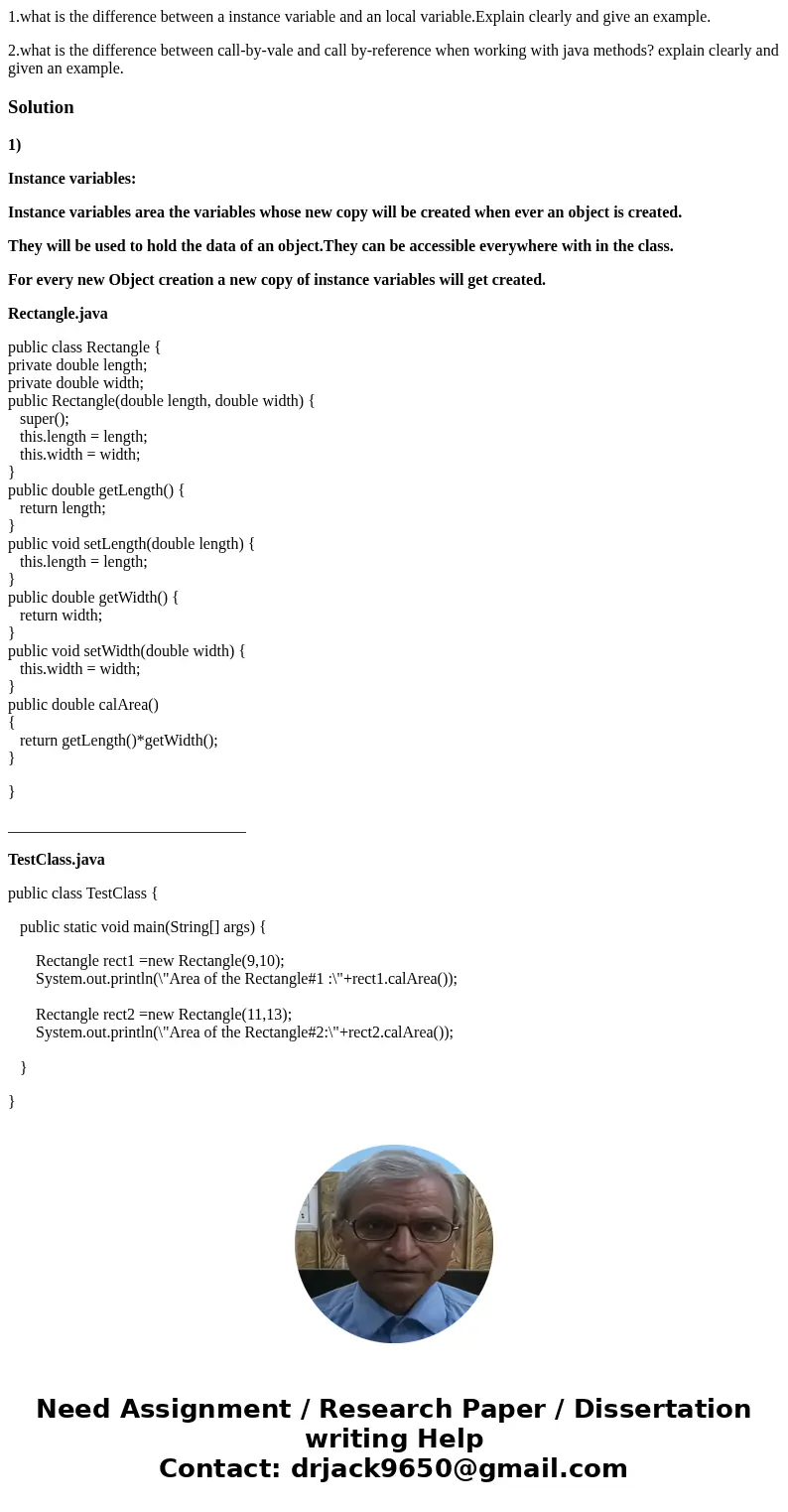
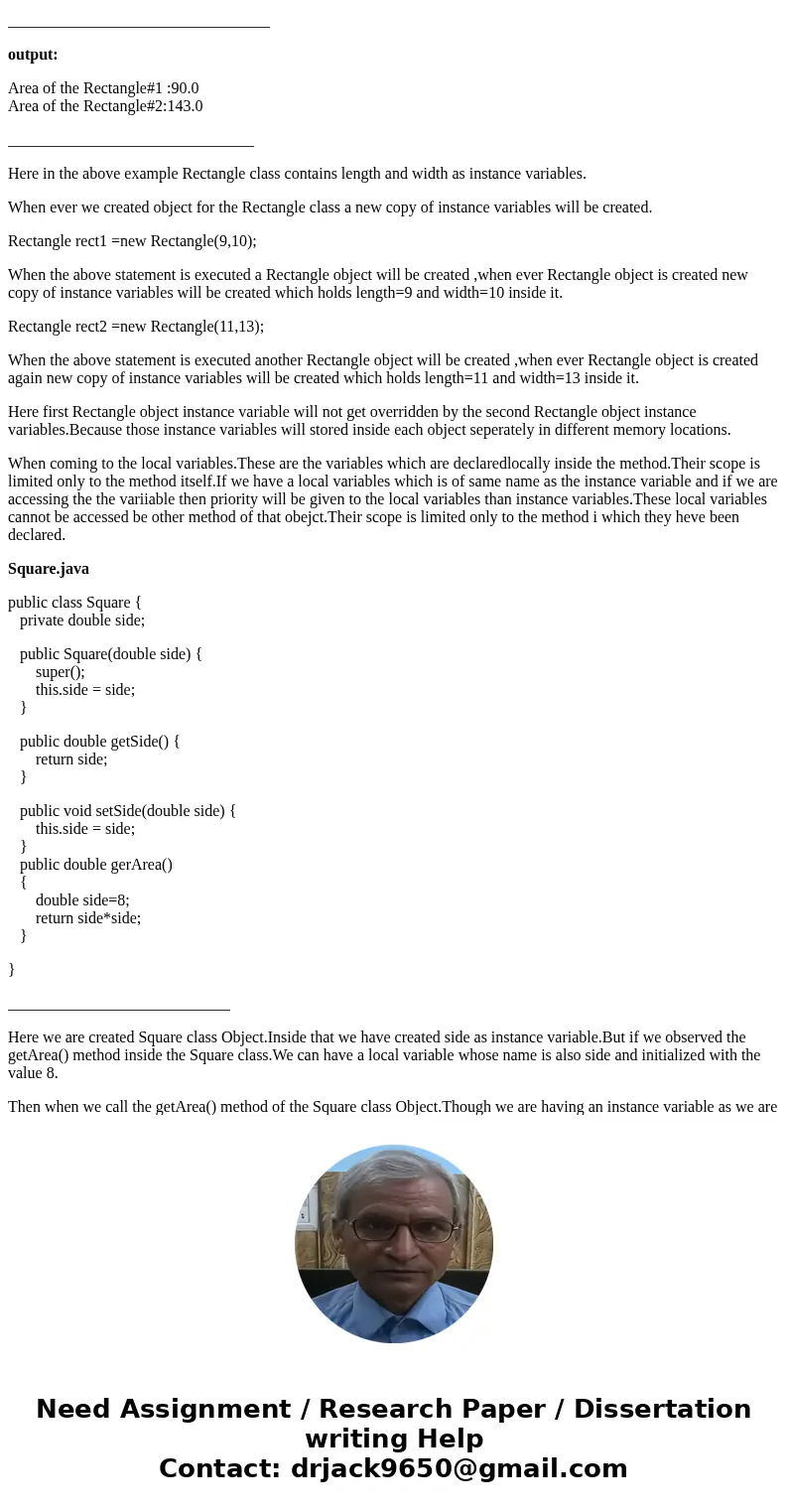
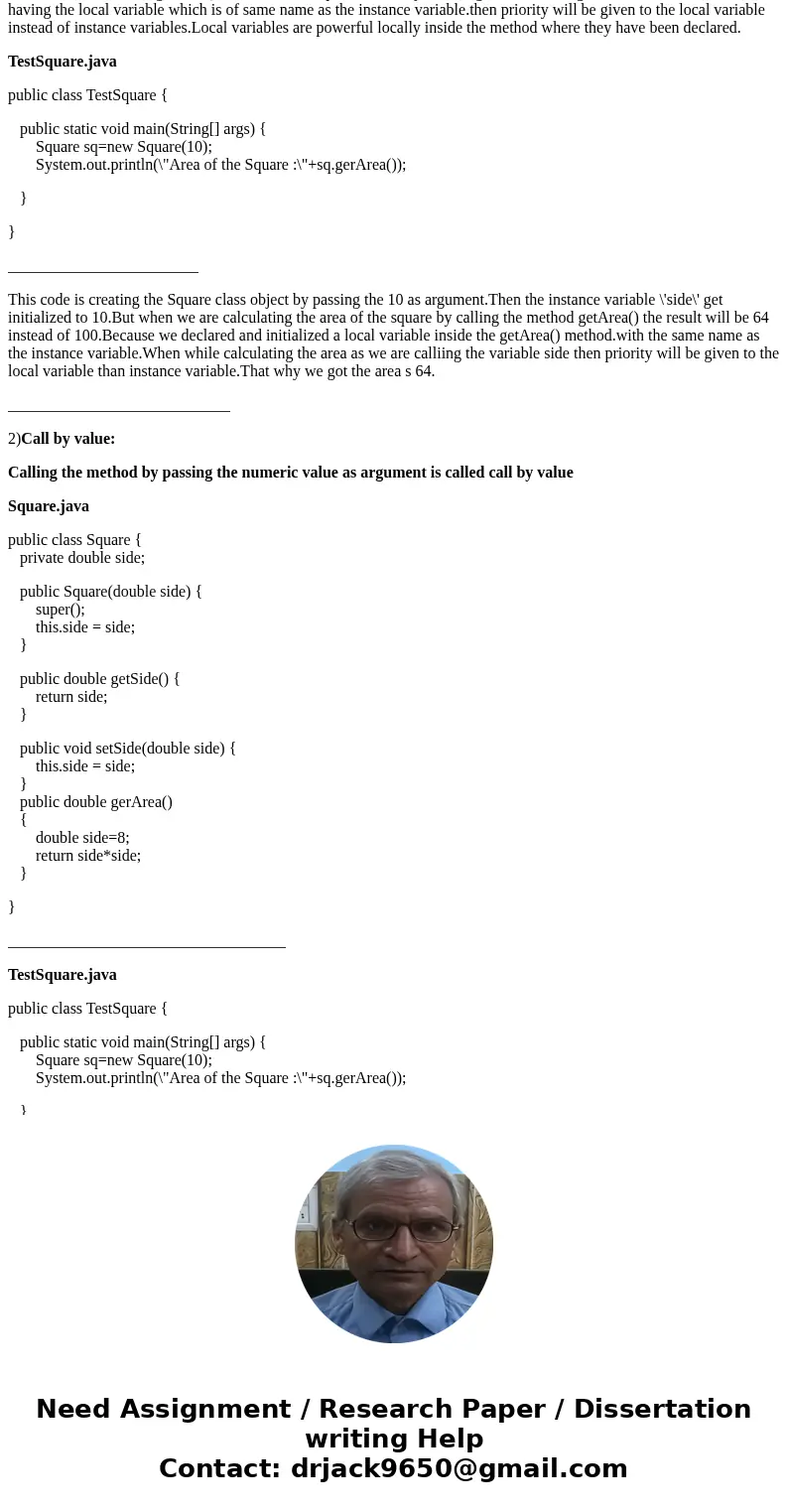
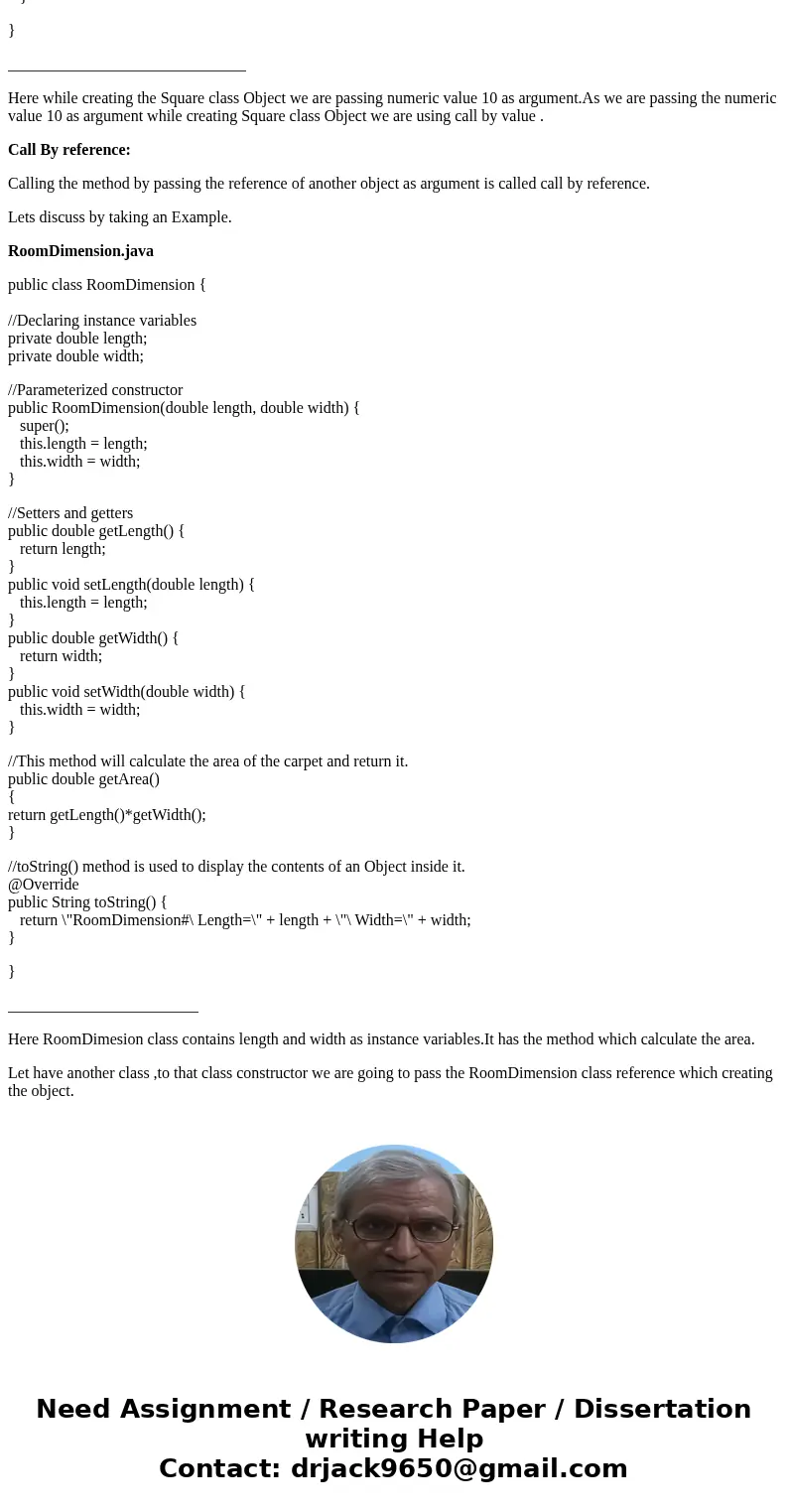
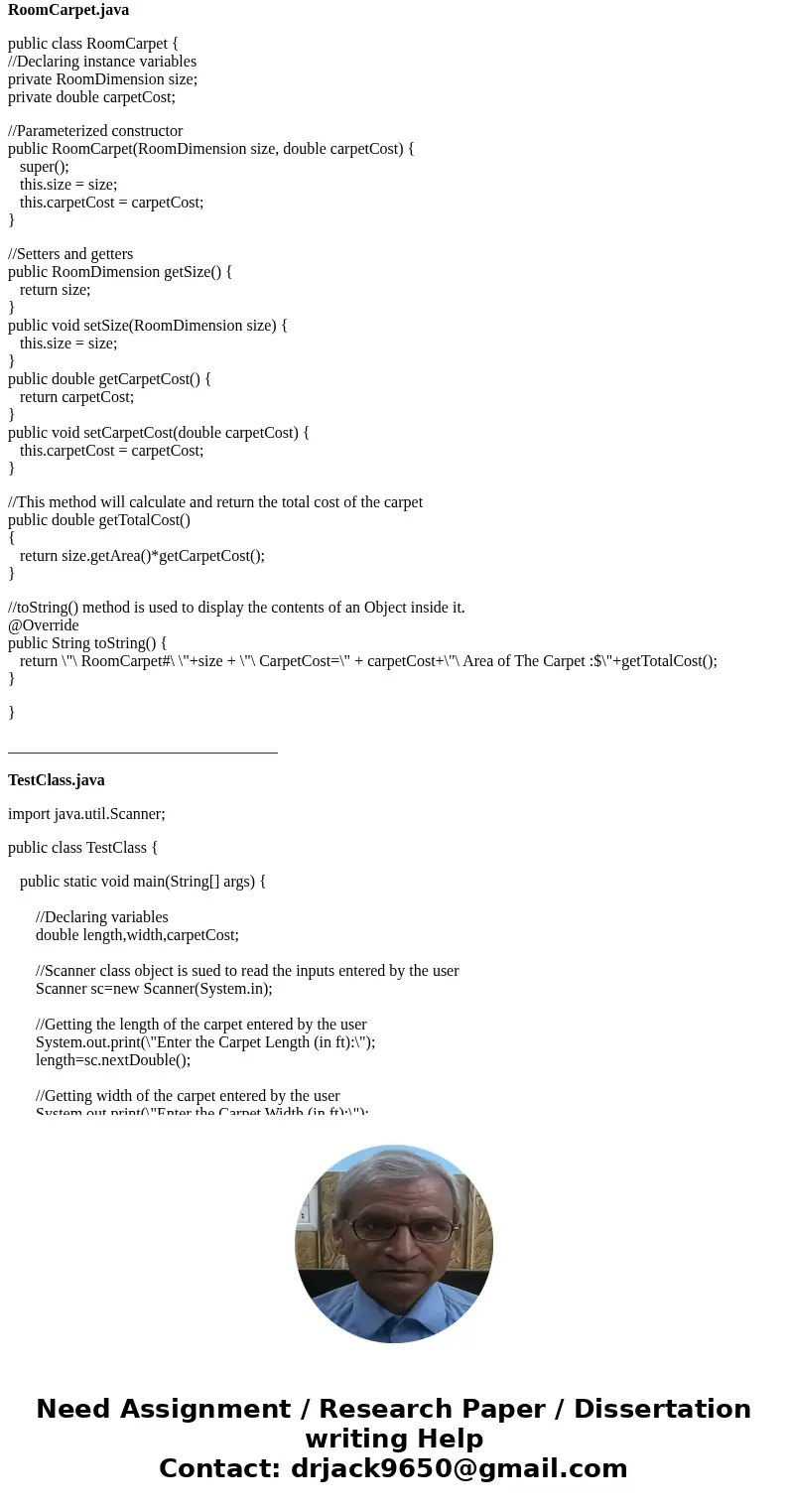
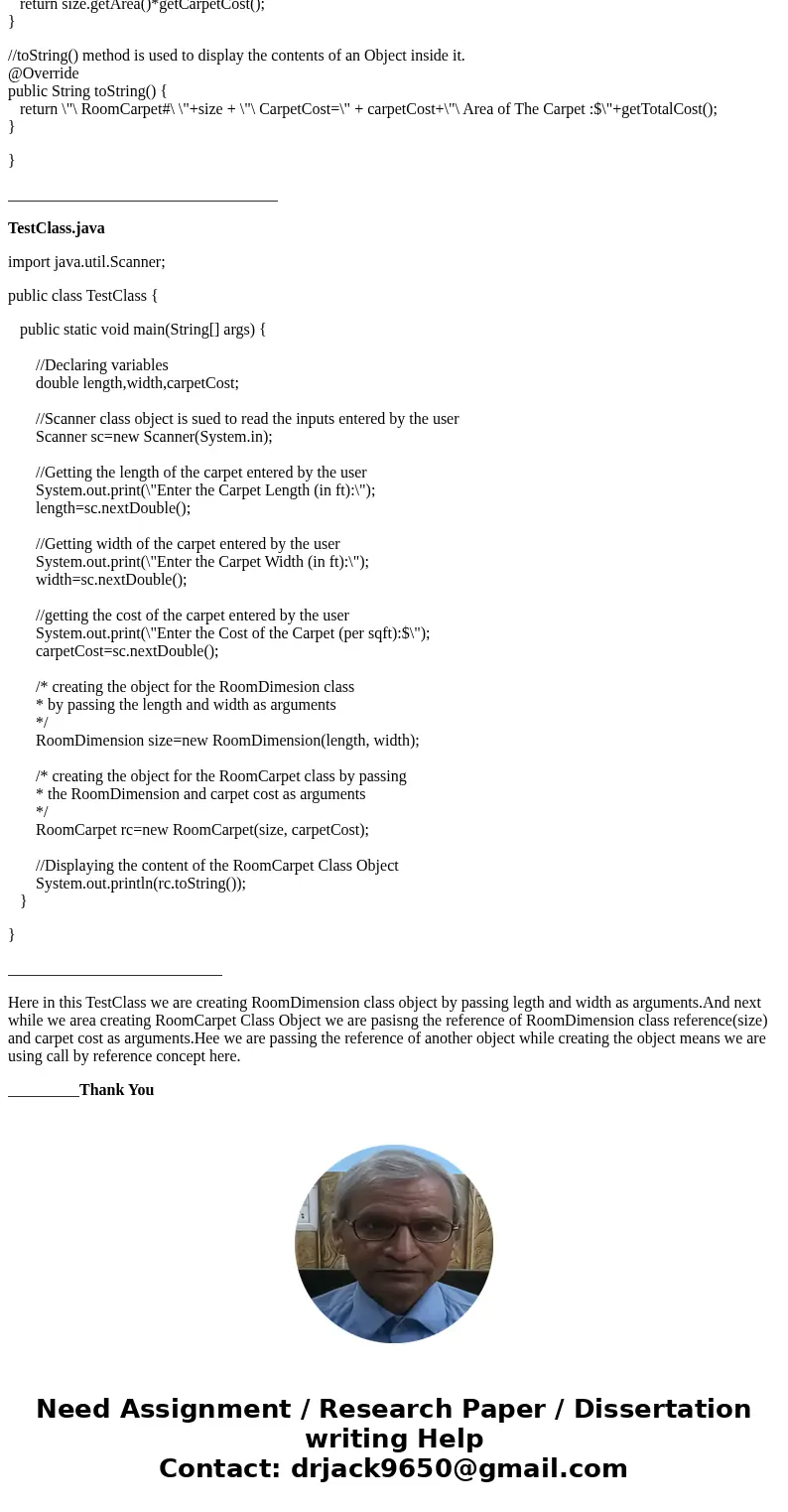
 Homework Sourse
Homework Sourse